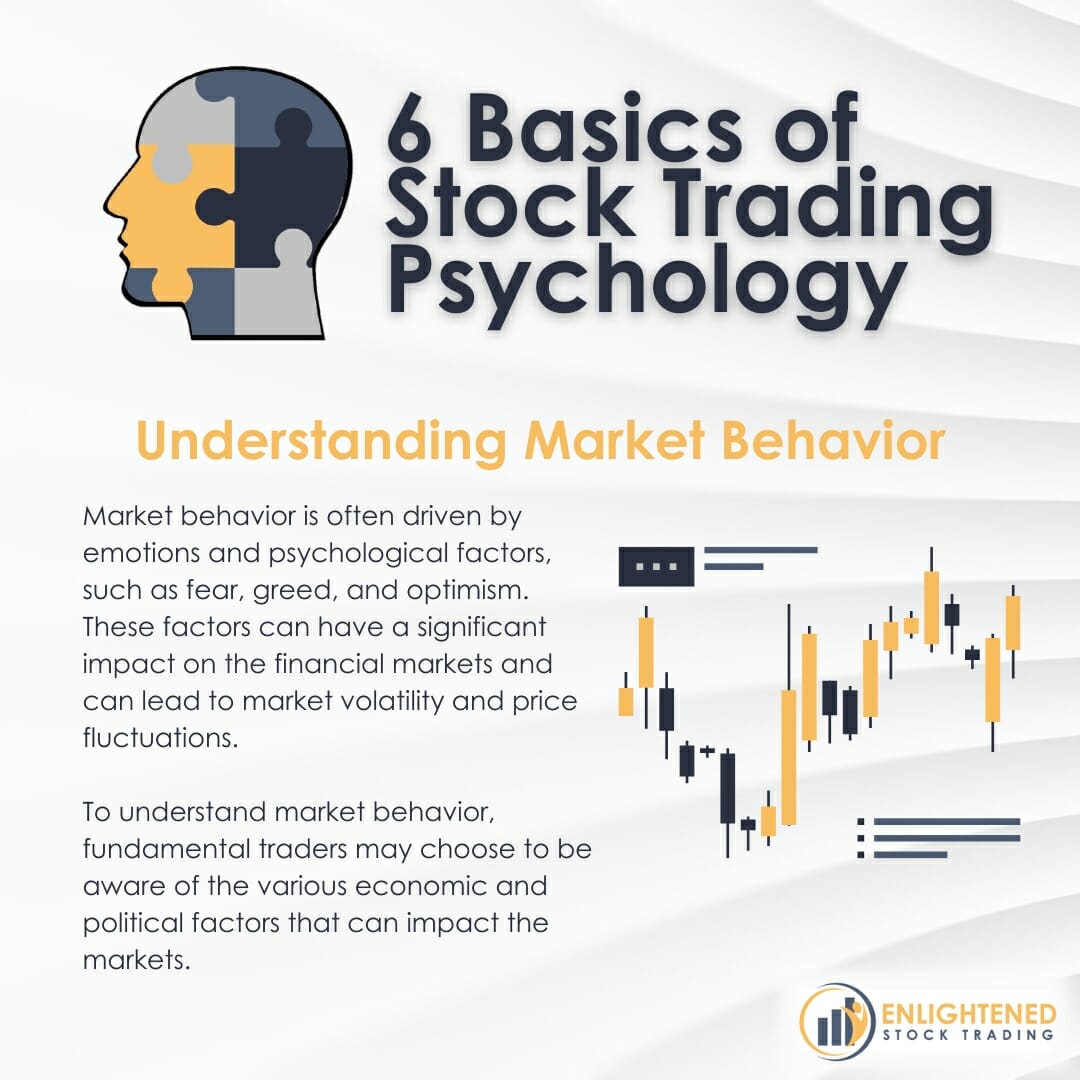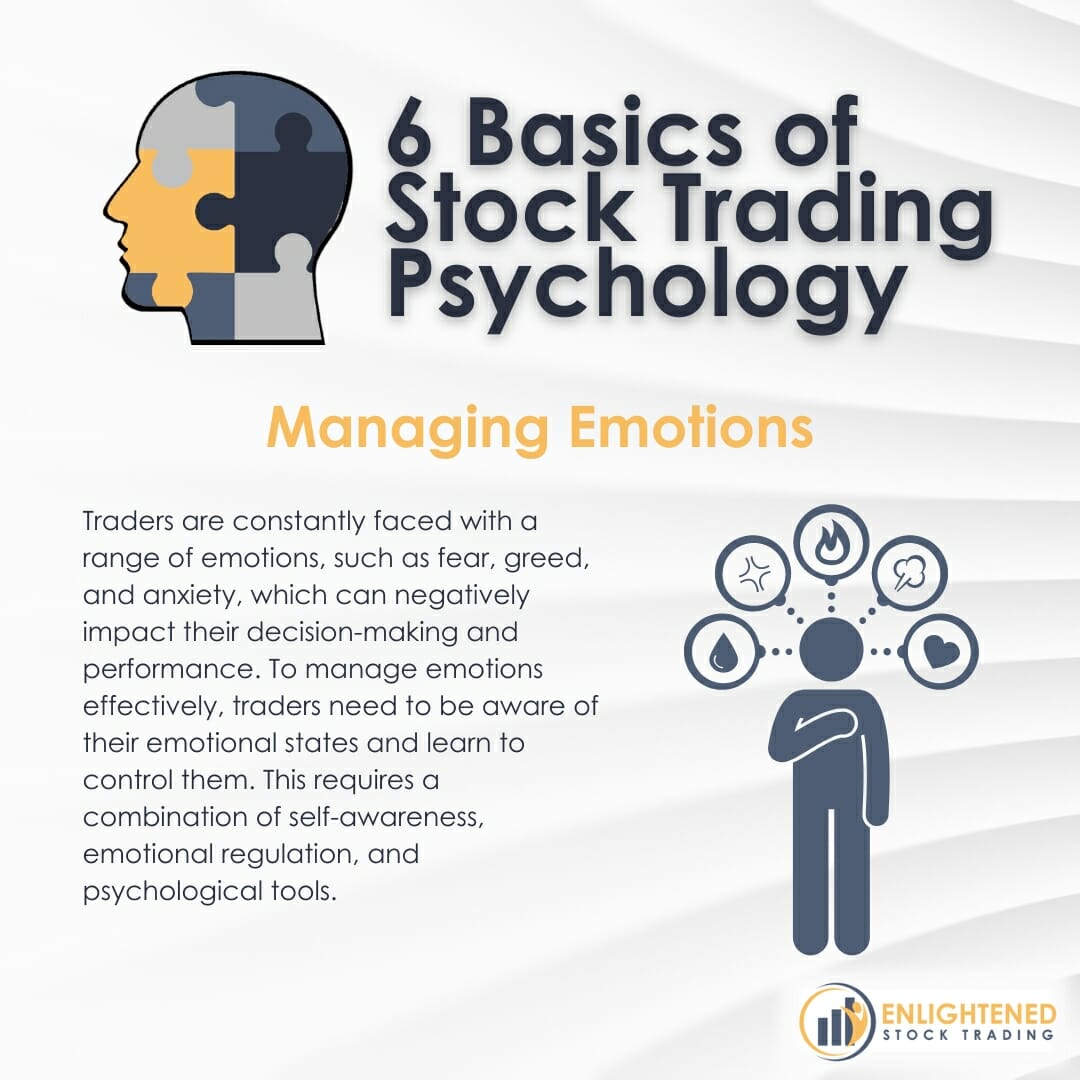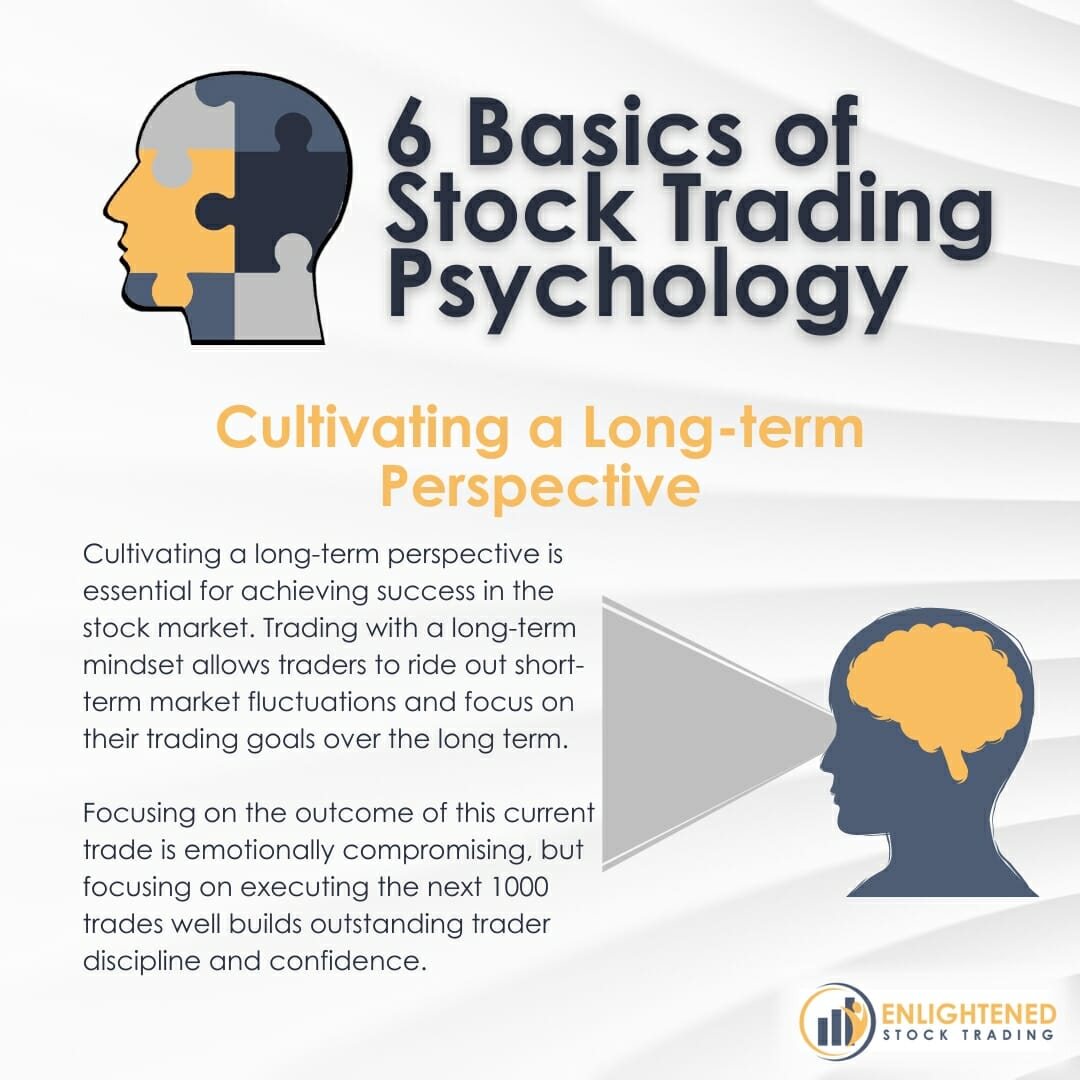Trading stocks is not just about numbers and charts. It’s also about the state of your mind and emotions. This is where stock trading psychology comes into play.
Stock trading psychology is a critical aspect of successful trading that often gets overlooked. It involves understanding the emotions and mental processes that drive decision-making in the financial markets. This includes recognizing the psychological biases that can negatively impact performance, such as overconfidence, fear, greed, and loss aversion.

Here are six basics to consider when pondering stock trading psychology:
1. Understanding market behavior
Understanding market behavior is essential for any trader looking to succeed in the financial markets. Market behavior is often driven by emotions and psychological factors, such as fear, greed, and optimism. These factors can have a significant impact on the financial markets and can lead to market volatility and price fluctuations.
To understand market behavior, fundamental traders may choose to be aware of the various economic and political factors that can impact the markets. For example, a change in interest rates, inflation, or political instability can all have a significant impact on the markets. Traders may also choose to pay attention to news and other market information, such as company earnings reports and economic indicators like the unemployment rate or GDP growth.

As a systematic trader the important factor in understanding market behavior is recognizing patterns and trends. By analyzing and backtesting historical data, systematic traders can identify patterns and trends in the markets that can help them make more informed trading decisions. For example, technical analysis can be used to identify patterns in price movements, such as the establishment of a new trend, the end of an existing trend, or support and resistance levels. These patterns can help systematic traders develop trading systems with an edge.
However, it’s important to note that the markets are not always rational and can be driven by emotions and other psychological factors. This can lead to market bubbles or crashes that can be difficult (impossible) to predict.
Fear is one of the most powerful emotions in the stock market. The fear of loss can lead to panic selling, where traders sell their stocks in a hurry, often at a loss, in order to stop the pain they are experiencing. This can create a downward spiral, as more and more traders panic and sell, driving down stock prices even further. Fear can also lead to inaction, where traders fail to take action on their trading signals, due to a fear of making a mistake or being wrong.
Greed is another powerful emotion that can drive stock market behavior. The promise of high returns can be alluring, and can lead traders to take on excessive risk in pursuit of short-term gains. This can lead to impulsive decision-making, such as buying stocks based on rumors or tips, or over-investing in a single stock in the hope of a quick payout. Greed can also lead to a failure to take profits, where traders hold on to a stock too long, in the hope of even higher returns, only to see the stock price collapse… Leading them back to fear.
Hope is another emotion that can have a significant impact on stock market behavior. The hope of future price growth or new compony developments can lead traders to buy stocks, even when the underlying fundamentals do not support the investment. This can lead to over-valuation of stocks, and eventually to a market correction, where the stock prices come back down to more reasonable levels.
Regret is also an emotion that can play a significant role in stock market behavior. The fear of regret can lead traders to make hasty decisions based on the fear of missing out (FOMO). This can lead to impulsive decision-making, such as buying a stock at a high price, or selling a stock too soon. Regret can also lead to a failure to take action, where investors fail to sell a stock at the right time, due to a fear of regretting the decision later on.
All traders need to be aware of the potential for irrational market behavior and take steps to protect their investments, such as setting stop-loss orders, having 100% objective trading systems so they always know exactly what they should be doing and diversifying their portfolios.
Ultimately, understanding market behavior is about having a comprehensive understanding of the markets and the factors that drive them. This requires a commitment to ongoing learning and having a diversified portfolio of trading systems that makes money in all market conditions and enables you to protect yourself from unexpected events. By doing so, traders can make informed trading decisions and avoid making impulsive decisions based on emotions or limited information.
2. Overcoming psychological biases
Traders (like all human beings) often suffer from psychological biases that can negatively impact their performance. These biases can be caused by a variety of factors, including past experiences, beliefs, and cultural norms. By recognizing and working through these biases, traders can make more rational decisions and avoid making impulsive decisions based on emotions.

Come common biases many traders exhibit include:
- Overconfidence
- Loss aversion
- Confirmation bias
However there are many more biases that affect traders. There is an extensive list of trading psychology biases with links to detailed articles explaining each bias at the bottom of this page.
One of the most common biases that traders face is overconfidence. This bias can lead to taking unnecessary risks and making unrealistic assumptions about the markets.
Overconfidence can also lead to a lack of discipline and the failure to stick to a trading plan. To overcome this bias, traders should be realistic about their abilities and be willing to seek advice and guidance from other traders and experts in the field.
Loss aversion is a bias can cause traders to hold on to losing positions for too long, hoping that the market will eventually turn in their favor. This can lead to significant losses and a lack of discipline in risk management. To overcome this bias, traders need to be willing to cut their losses and move on to the next trade. They should also be willing to set stop-loss orders to limit their losses.
Confirmation bias is another common bias that can impact trading performance. This bias can lead traders to seek out information that supports their existing beliefs and ignore information that contradicts those beliefs. To overcome this bias, traders should be willing to consider all available information and not be influenced by their preconceived notions or biases, or taking even more powerful action to eliminate their own beliefs from the decision making process by implementing objective trading systems.
Overcoming biases is critical to achieving success in the financial markets. By recognizing and overcoming biases such as overconfidence, loss aversion, and confirmation bias, traders can make more rational decisions and avoid making impulsive decisions based on emotions. To overcome biases, traders need to be realistic about their abilities, set realistic goals, be disciplined in risk management, execute back tested trading systems and be willing to seek advice and guidance from other traders and experts in the field. By doing so, they can achieve greater success in their trading.
3. Developing a trading plan
A trading plan is a detailed set of guidelines that outline a trader’s approach to trading. It includes a set of rules for entry and exit points, risk management, position sizing, and other key factors that impact trading performance.
Developing a trading plan is an essential step for traders, as it provides a framework for making informed trading decisions. A well-developed trading plan can help traders to stay disciplined, manage risk, and avoid making impulsive decisions based on emotions. It can also help traders to stay focused on their goals and make informed decisions that are in line with their overall strategy.
To develop a trading plan, traders need to start by setting clear and realistic goals. This includes setting targets for profits and identifying the amount of capital that they are willing to risk. It’s important to remember that trading is a long-term game, and success is measured over a period of months and years, not days and weeks.

Once traders have set their goals, they need to develop a set of rules for entry and exit points. This includes identifying the technical indicators and chart patterns that will be used to identify trading opportunities, as well as setting stop-loss and take-profit levels. It’s important to remember that a trading plan should be flexible and adaptable to changing market conditions.
Risk management is also an essential component of a trading plan. This includes identifying the maximum amount of capital that will be risked on any one trade, as well as setting rules for position sizing. Traders should also be prepared to cut their losses and exit losing trades when necessary.
Finally, traders should consider the impact of emotions on their trading performance. By recognizing and addressing the psychological biases that can negatively impact trading performance, traders can make more rational decisions and avoid making impulsive decisions based on emotions.
4. Maintaining discipline
Trading requires a high level of discipline and self-control, as traders are constantly faced with emotional and psychological challenges that can negatively impact their performance.
One of the most important aspects of maintaining discipline is sticking to a trading plan. A trading plan provides a set of rules and guidelines for making informed trading decisions, managing risk, and avoiding impulsive decisions based on emotions. Traders who deviate from their trading plan are more likely to make irrational decisions that can lead to losses.

Another key aspect of maintaining discipline is managing risk. Traders who take on too much risk are more likely to suffer large losses, while traders who are too risk-averse may miss out on profitable opportunities. Managing risk requires a disciplined approach to position sizing, stop-loss orders, and take-profit targets. Traders who stick to their risk management rules are more likely to achieve consistent, long-term success in the financial markets.
Maintaining discipline also requires managing emotions. Traders are often faced with strong emotions such as fear, greed, and overconfidence, which can lead to impulsive decisions and irrational behavior. To maintain discipline, traders need to be aware of their emotions and learn to manage them effectively. This may include journaling, taking breaks from trading, practicing relaxation techniques, or seeking support and guidance from other traders or professionals.
Consistency is another important aspect of maintaining discipline. Traders who are inconsistent in their approach to trading are more likely to make impulsive decisions and suffer losses. Consistency requires a disciplined approach to trading, including sticking to a trading plan, managing risk, and controlling emotions. Traders who are consistent in their approach to trading are more likely to achieve long-term success in the financial markets.
Once again maintaining discipline also comes back to having objective rules that you have the confidence to follow. Building this level of unshakeable confidence is exactly what you get when you join The Trader Success System.
5. Managing emotions
Traders are constantly faced with a range of emotions, such as fear, greed, and anxiety, which can negatively impact their decision-making and performance. To manage emotions effectively, traders need to be aware of their emotional states and learn to control them. This requires a combination of self-awareness, emotional regulation, and psychological tools.
One of the most important tools for managing emotions is developing a mindset of detachment. This means that traders should aim to detach themselves from the outcome of each trade, and instead focus on executing their trading plan effectively. By focusing on the process rather than the outcome, traders can reduce the emotional impact of losses and avoid making impulsive decisions based on emotional reactions.

Too many traders measure their performance in terms of dollars made or lost each day. The challenge is this outcome is largely out of your control and very random. However if you have a positive expectancy trading system and a good trading plan that you follow each day, you can measure your performance very effectively by asking questions like “Did I follow my system today?” and “Did I stick 100% to my trading plan today?”. When you answer yes to these questions consistently then your chances of making money trading stocks increases dramatically.
Another important tool for managing emotions is developing a positive mindset. Traders who approach the markets with a positive mindset are more likely to remain calm and focused, even in the face of challenging market conditions. Positive affirmations, visualization techniques, and mindfulness practices can all be effective tools for developing a positive mindset and managing emotions.
In addition, traders need to learn to manage their stress levels effectively. Trading can be a high-stress activity, and traders who are not able to manage their stress levels effectively are more likely to make impulsive decisions based on emotions. Effective stress management techniques include exercise, meditation, deep breathing, and getting enough sleep.
Finally, traders need to have a support system in place to help them manage their emotions. This may include a mentor, family, friends, or other traders who can provide emotional support and guidance. Traders may also benefit from working with a coach or therapist who specializes in trading psychology.
6. Cultivating a long-term perspective
Cultivating a long-term perspective is essential for achieving success in the stock market. Trading with a long-term mindset allows traders to ride out short-term market fluctuations and focus on their trading goals over the long term.
Focusing on the outcome of this current trade is emotionally compromising, but focusing on executing the next 1000 trades well builds outstanding trader discipline and confidence.
One of the key benefits of a long-term perspective is the ability to take advantage of the power of compounding. Compounding is the ability of your capital to generate earnings, which are then reinvested to generate even more earnings. Over time, compounding can significantly increase the value of your trading account, providing a powerful tool for wealth accumulation.

Another benefit of a long-term perspective is the ability to reduce the emotional impact of market volatility. The stock market can be highly volatile in the short term, with sudden fluctuations in stock prices due to a variety of factors, including economic news, political events, and sentiment. By taking a long-term perspective, traders can avoid getting caught up in short-term market fluctuations and focus on the underlying fundamentals of their trading strategy.
Trading with a long-term perspective also provides an opportunity to take advantage of the power of diversification. Diversification is the practice of trading in a variety of different markets, strategies and timeframes, in order to reduce the impact of any one trading strategy on the overall portfolio. By diversifying their trading, traders can reduce the risk of loss and potentially increase the return on their capital.
To cultivate a long-term investment perspective, it is important for traders to have a clear understanding of their trading goals and to develop a well-defined trading plan. Traders should also develop a clear understanding of their risk tolerance and trade accordingly. This can involve trading a mix of different markets, strategies and timeframes, and avoiding excessive risk or trades that are outside of their comfort zone.
Finally, taking a long-term perspective is important to help traders remain patient and disciplined, even in the face of market volatility and uncertainty. This can involve avoiding impulsive decision-making, sticking to the trading plan, and avoiding the temptation to make sudden changes based on short-term market fluctuations.
Stock trading psychology is a critical aspect of successful trading. By understanding market behavior, overcoming biases, developing a trading plan, maintaining discipline, managing emotions, and cultivating a long-term perspective traders can make more informed decisions and avoid making impulsive decisions based on emotions in the financial markets.
Useful Articles About Trading Psychology Topics
- What You Need to Know about Trading— An Interview with Adrian Reid
- Adrian Interviews Peter Castle On Trading Psychology And Discusses His New Book – The Zen Trader
- Trading Psychology| 4 Things That Can Happen Trading Stocks
- The Great Trading Debate: TRADING PSYCHOLOGY OR TRADING SYSTEM?
- Trading Psychology: Stop Focusing On The Money!
- Fastest way to improve your trading psychology & eliminate stress
- Trader Warning Signs
- What Is the Biggest Trading Challenge You Have Faced?
- 10 Stock Trading Myths That Could Be Holding You Back
Books on Trading Psychology
Next Steps to Boost Your Trading Psychology
Successful trading requires more than just a knowledge of the markets and technical analysis. Trading psychology is a critical aspect of trading that can make the difference between success and failure. Traders who take the time to understand market behavior, overcome biases, develop a trading plan, maintain discipline, manage emotions, and cultivate a long-term perspective are more likely to make informed decisions and avoid making impulsive decisions based on emotions.
It’s important for traders to implement a diversified portfolio of trading systems that they have 100% confidence in as their main tool to conquer their trading psychology. By doing so, they can reduce the impact of any one trading system on their overall portfolio and increase their chances of long-term success. The Trader Success System is a comprehensive course that can help traders quickly move beyond the psychological problems most traders face by implementing a portfolio of systems and learning the skills to fully backtest and build confidence in those systems.
Remember, successful trading is a long-term game, and it requires patience, discipline, and a focus on the big picture. By mastering the psychological aspects of trading and implementing a well-defined trading plan and portfolio of systems, traders can achieve consistent, long-term success in the financial markets.
Trading Psychology and Psychological Bias Articles
To dive deeper into how other psychological biases affect your trading psychology and decisions as well as practical ways to overcome them, explore the articles below. For a comprehensive guide on mastering your mindset and building a resilient psychology, visit our Trading Psychology page.
- Action Bias in Trading
- Ambiguity Aversion in Trading
- Anchoring And Adjustment in Trading
- Anchoring Bias in Trading
- Authority Bias in Trading
- Availability Heuristic in Trading
- Bandwagon Effect in Trading
- Bias Blind Spot in Trading
- Choice-Supportive Bias in Trading
- Commitment And Consistency Bias in Trading
- Confirmation Bias in Trading
- Conservatism Bias in Trading
- Contrast Effect in Trading
- Decoy Effect in Trading
- Disposability Effect in Trading
- Disposition Effect in Trading
- Dunning-Kruger Effect in Trading
- Endowment Effect in Trading
- Escalation Of Commitment in Trading
- Familiarity Bias in Trading
- Framing Effect in Trading
- Gambler's Fallacy in Trading
- Halo Effect in Trading
- Herd Mentality in Trading
- Hindsight Bias in Trading
- House Money Effect in Trading
- Hyperbolic Discounting in Trading
- Information Bias in Trading
- Loss Aversion in Trading
- Money Illusion in Trading
- Narrative Fallacy in Trading
- Neglect Of Probability in Trading
- Normalcy Bias in Trading
- Optimism Bias in Trading
- Ostrich Effect in Trading
- Outcome Bias in Trading
- Overconfidence Bias in Trading
- Paralysis By Analysis in Trading
- Pessimism Bias in Trading
- Recency Bias in Trading
- Regret Aversion in Trading
- Representativeness Heuristic in Trading
- Salience Bias in Trading
- Selective Perception in Trading
- Self-Attribution Bias in Trading
- Status Quo Bias in Trading
- Sunk Cost Fallacy in Trading
- Survivorship Bias in Trading
- Trading Psychology in Trading
- Zero-Risk Bias in Trading



